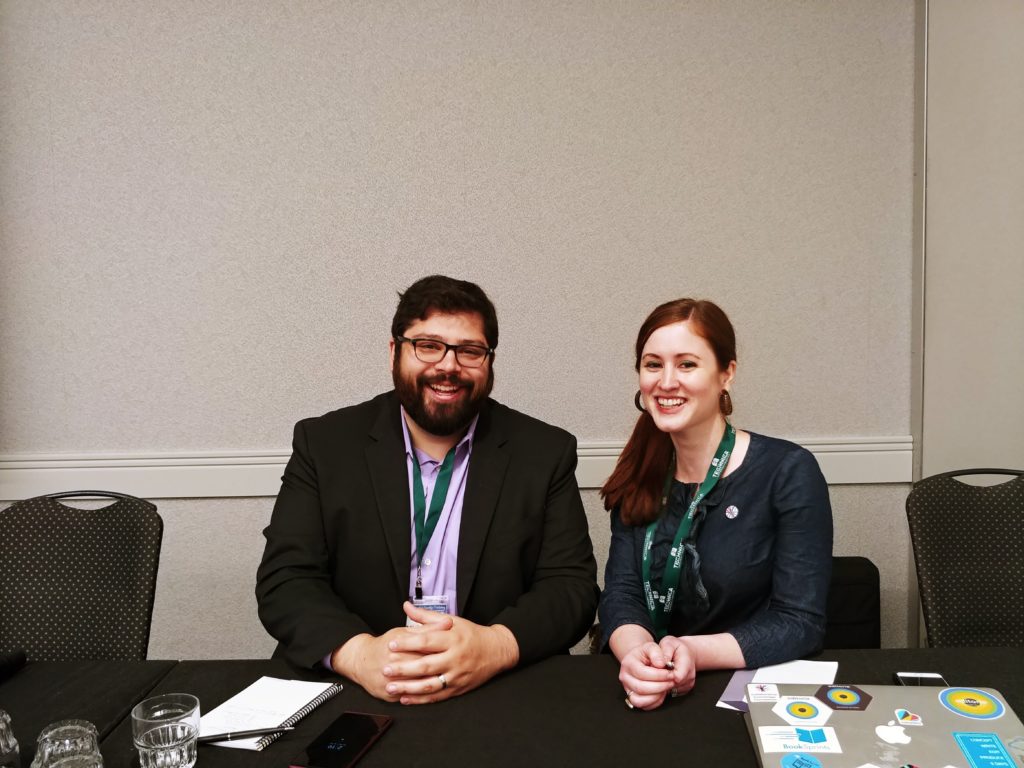 MODERATOR:
MODERATOR:
Angela Cochran
American Society of Civil Engineers
Reston, Virginia
SPEAKER:
Michael Di Natale
BioOne
Arlington, Massachusetts
Alison O’Connell
CoKo Foundation
South Hampton, New Hampshire
REPORTER:
Alaina Wangsgaard
Western North American Naturalist
Provo, Utah
In the current climate of mergers and acquisitions, it can be difficult for smaller publishing houses and scientific societies to maintain their identities. This session aimed to offer viable alternatives to mergers and acquisitions, as well as to assuage the fears associated with them.
To start off the presentation, the moderator, Angela Cochran of the American Society of Civil Engineers, said a few words. She described a variety of drawbacks, both perceived and real, that come with mergers, such as a loss of influence with vendors, a shift in the size of the pond, a change in the company’s mission, and the idea of paying competitors. All of these are tough pills to swallow, but Cochran also took care to describe some of the positive elements that come from mergers. For instance, a merger makes it easier for a smaller company to join a group with a more consistent roadmap, and a bigger fish can now push development in the field. Although mergers are difficult, Cochran explained, they can be used as collaborative efforts to improve scholarly publishing as a whole. Cochran also gave a brief overview of the options available to companies that don’t want to consider a merger, such as moving to another commercial platform, partnering with other societies, and exploring open-source tools.
The first speaker was Michael Di Natale from BioOne. He outlined the process that BioOne took in their recent partnership with SPIE, and the lessons that both companies learned along the way.
Originally, BioOne wasn’t looking for a partnership, but merely for a cheaper platform vendor so they could reduce their overhead costs. When none of the options available seemed particularly appealing, they decided to turn to a completely untested option: a partnership with SPIE and the platform that SPIE had built for their own content.
As noncompetitive, mission-aligned nonprofits, both companies offered something of value to the other—BioOne could share the overhead costs of the platform SPIE had already begun building for themselves, and SPIE could benefit from BioOne’s experience and knowledge of different portions of the scholarly communications industry. After much discussion, the companies decided to move forward with the partnership.
Di Natale describe several lessons that he had taken from his time working on the partnership. Firstly, he explained that when companies don’t like their options, they need to be willing to create new options. Secondly, he recommended that companies be able to mitigate risk and manage their expectations. Lastly, he stated the fact that no transition will be seamless, and companies should be prepared for bumps along the road.
Di Natale closed his presentation by emphasizing the importance of collaboration and building relationships in the partnership process with SPIE. Through collaboration, more opportunities will inevitably open up.
After Di Natale’s presentation, Alison O’Connell gave a presentation about the Collaborative Knowledge Foundation (CoKo), which is part of an open-source community for building editing and publishing tools called PubSweet. O’Connell explained how PubSweet can provide a good alternative to large-scale proprietary tools. The shared open infrastructure of PubSweet means that companies can collaborate and offer their created tools to anyone on the platform, while still staying competitive: while the basic framework for programs built with PubSweet is the same, at the interface level, applications can vary wildly. There is a large advantage to using the same open-source infrastructure and then differentiating at the brand level.
O’Connell listed examples of programs built with PubSweet that may be of use to a wide audience, including Libero Reviewer, a submission and peer-review system developed by eLife; the Europe PMC Plus platform, a manuscript submission and preview platform; Editoria, a CoKo-built program designed for typesetting books online; and a variety of others.
O’Connell concluded her presentation by stating that the work of developing new, better tools for publishing companies goes faster when an open-source community works together and shares its developments openly.
When O’Connell’s presentation ended, the floor was opened up for audience members to ask questions. Several people wanted to know how BioOne will proceed if SPIE decides to add more publishers to its platform. Michael Di Natale explained that there is language in BioOne’s contract with SPIE that accounts for that possibility, and recommended that other companies in such partnerships take the same precautions.
There was also discussion about the difficulties of getting a small publisher or company to jump on board with an open-source community, especially when there is so much risk involved compared to working with a well-established vendor. Alison O’Connell emphasized that PubSweet is more about a framework and methodology for building tools, not necessarily a be-all end-all, and that its usefulness is dependent on how much work an organization is willing to put in.
There are plenty of options for companies who are looking for alternatives to mergers, some of which were explored in these presentations. The community-driven efforts of PubSweet and the home-grown partnership between BioOne and SPIE will continue to serve as good examples of how to collaborate in the world of scholarly publishing.
